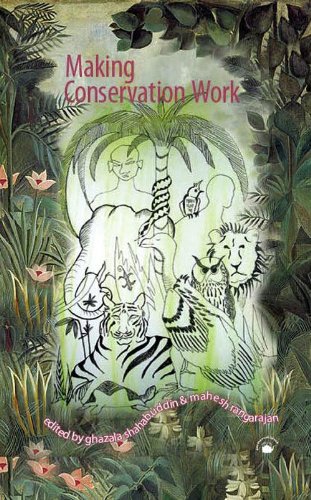Verwandte Artikel zu Making Conservation Work
Neu kaufen
Diesen Artikel anzeigenEUR 23,50 für den Versand von Indien nach Deutschland
Versandziele, Kosten & DauerSuchergebnisse für Making Conservation Work
Making Conservation Work : Securing Biodiversity in this New Century
Anbieter: Vedams eBooks (P) Ltd, New Delhi, Indien
Hardcover. Zustand: New. Contents Acknowledgements. Notes on contributors. Introduction/Mahesh Rangarajan and Ghazala Shahabuddin. I. Critiques 1. Displacement as a conservation tool Lessons from the Kuno wildlife sanctuary Madhya Pradesh/Arpan Sharma and Asmita Kabra. 2. Of paper tigers and invisible people The cultural politics of nature in Sariska/Radhika Johari. II. Reappraisal 3. Deconstructing sea turtle conservation in India/Kartik Shanker. III. Emergent paradigms 4. The politics of participatory conservation The case of the Kailadevi wildlife Sanctuary Rajasthan/Priya Das. 5. The ecology of income Can we have both fruit and forest/Nitin D. Rai. IV. Innovation 6. Threatened forests forgotten people/Aparajita Datta. 7. Rainforest restoration and wildlife conservation on private lands/Divya Mudappa and T.R. Shankar Raman. 8. The hunter and the hunted Conservation with marginalized communities/Bahar Dutt Rachel Kaleta and Vikram Hoshing. Bibliography. Wildlife today is competing with some of India's most underprivileged people for survival. This apart commercial and industrial pressures from far outside part boundaries reverberate within these fragile ecological oases making them vulnerable in a way they never have been before. Reconciling the question of preserving what little wildlife remains with the needs of humans has never seemed as tangled. Fortress conservation based solely on strict nature protection is one response to these pressures a response under attack. Recent tiger crises and tribal land rights debates have highlighted the opposition of strict preservationists to advocates of people's rights. Meanwhile fresh work in sociology and biology and innovative interventions show new ways forward that do not neatly fit existing paradigms. The book moves from generalities to specifics from ideal models to working approaches that seek to secure India's biodiversity by fashioning practical responses based on new often unexpected partnerships. A lucid introduction outlines the conservation situation in India the essays that follow illustrate various facets of it. Each essay is deeply grounded in the field the authors explore whether and how far animal and human needs can be reconciled. Making Conservation work articulates a new urgent discourse on conservation. It is a volume that looks ahead with cautious hope. For all who want to understand the conservation debate today this is an indispensable book. 298 pp. Bestandsnummer des Verkäufers 65212
Anzahl: 1 verfügbar

